
Petra Peña wants to be a cuentista, a storyteller, like her abuelita. But Petra’s world is about to change forever. Earth is gone-destroyed by an asteroid. Petra and several hundred humans are voyaging hundreds of years into the future in the hope of saving humanity on a different planet. Before arriving on the new planet Petra and the others will remain in a sleep stasis, downloading information that will help them start over a new planet.
When Petra wakes up, hundreds of years later, she soon discovers the original plan has drastically changed. There is a new group in charge of their spacecraft with a different agenda for those left on board. What does the future hold for Petra and the others? Will she be reunited with her family, and preserve the art of storytelling for future generations?
This is an enjoyable book for ages 12+ who are interested in sci-fi but who might be intimidated to pick up a traditional title from the genre. It’s layered with a beautiful message of family, perseverance, and the lifesaving power of storytelling.
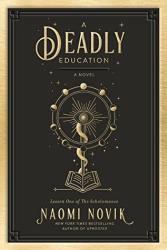
A Deadly Education follows a young sorceress, Galadriel, struggling to survive inside the Scholomance, a school floating outside our reality in a dark void. The school is home to thousands of mals that want nothing more than to tear apart the school's young, squishy magicians, and after the fabled graduation that usually kills about half of the already picked-off graduating class, barely a quarter of students make it. Galadriel, known as El, has to dodge these murderous mals, classmates turned dark, treacherous beasts in the vents, punishing curriculum, her own inclination towards dark magic, and a suspiciously helpful and heroic classmate if she hopes to graduate junior year.
Like all Harry Potter obsessed children, I've read my fair share of the magic school knockoffs that popped up to rake in our sweet, sweet income after the former's stunning success. I've read about fun schools, dark schools, elf schools, schools with just a little magic, schools with way too much magic, complicated schools, normal schools with some sparkle, and everything in between. While these have all varied in quality, none have come close to replicating the same unique nature of the Harry Potter franchise, likely in large part to their resemblance, as readers see "magic school" and can only think of it as a less impressive Hogwarts. This book stands out heavily from the rest, and is one of the first one of these I've read and genuinely thought "Hey, maybe this isn't a blatant attempt to capitalize on my generation's Harry Potter obsession." Instead of capitalizing on the fun shenanigans and beautiful imagery of magic as the Harry Potter books, and most subsequent knockoffs, this book is immediately sobering. Instead of trying to transport the reader to a world of magic beings and sparkling wands, the book opens with a near death experience of the main character, then proceeds to hammer in the normality of the situation. It introduces a strict barter system, the mundaneness of horrible deaths, the need for constant vigilance, and the constant threat of a horrible demise looming over every characters head in El's matter-of-fact, blunt voice. There's no funerals or scandals when someone dies, only remembering where there body is to watch out for the mals that will devour it. Every minute of these teenagers' lives is calculating the odds and risks to get them out alive, fully knowing that most of those with them won't make it out. And its a really, really fun read.
The way the authors shows the creative and all-encompassing ways these characters keep themselves safe from monsters that are literally everywhere makes every moment and character decision fascinating. Just getting a meal involves putting wards on tables, finding sun lamps to sit under, making sure your food isn't poisoned, avoiding the mals hiding in or around the food, and getting a spot far enough from the doors to make sure you aren't first in line if something large and hungry charges in. The amount of thought and detail and danger the author weaves into her world is truly astounding, and gives it that special flavor that finally isn't "Harry Potter but a little to the left." The tone and voice of the book is completely distinct from anything I've ever read. Lots of books try to sell that "we're constantly in danger" bit, but it rarely works since the main cast has plot armor and all the side characters that die get appropriate sadness and deep reflections on the fragility of life from the main characters. When someone dies in this book, they're dead, and that's it, and the characters have to move on or their distraction will get them dead too. It's like a war story set inside a high school, with children talking about rationing empathy and leaving their friends corpses on tables like its just a part of life. And its sad, sure, but the bluntness of it all makes it such a no-nonsense, tight narrative that you can't really grudge it that.
It helps that the narrator, El, is a very logical person, who views deaths as inconvenient but inevitable while still seeming to be a generally kind person. El herself is also very well fleshed out, clearly given her own distinct motivations and temperament. She's hardworking and resourceful, while also being bitingly sarcastic. She has flaws and problems, but watching her work through these throughout the story is immensely satisfying. Her friends and foils get the same treatment. While they're definitely not as well explored as El, they're all characters in their own right, who are also fun to watch survive. And we're all aware of the fact that it would be very easy and in character with the world for them to die, making the stakes gripping and giving the book a quality that makes it almost impossible to put down. There's also this really great main side character who acts like the classic YA protagonist with a ton of idealism and heroism and genuine kindness, and El just thinks he's a huge idiot for some really good reasons that are kind of a reflection on the usual idea of the "hero" as a whole, and their dynamic is super fun!
I read this book maybe six months ago, and I'm rereading it now, and I'm thinking of buying it because it is just that good! It has a distinct tone and a unique world that is explained by a main character we like and fleshed out by a school we can't help but want to know more about. The only real critique I have of this book is the fact that its a bit heavy on exposition, especially in the beginning, but the world is so strange and intense that I was fine learning about it, no matter how long it dragged on. All in all, this book is amazing, and I would recommend it to anyone who wants salty and cool heroines, side characters with protagonist flavor, an extremely vivid and dangerous world, some good emotional wringing, and a conclusion that promises so much more!
Reviewer Grade: 11
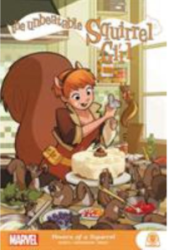
I was first made aware of this somewhat obscure Marvel superhero because I am a regular reader of Ryan North's Dinosaur Comics webcomic series. While I sat on the knowledge of Squirrel Girl's existence for some time, I finally broke down and bought the two-volume collection of North's imagining of the hero. In this first volume, Powers of a Squirrel, we get to know Doreen Green (aka Squirrel Girl), a computer scientist student studying at Empire State University.
As a much more comedic superhero compared to the likes of Iron Man or Captain America, Squirrel Girl's claim to fame is the fact that she is "Unbeatable." This includes defeating some of Marvel's most fearsome and powerful villains in unique ways that don't involve violence. Sure, sometimes Squirrel Girl has to get her paws dirty, but the more amusing storylines are the ones where she saves the day using unconventional squirrel-based techniques. That being said, it's a funny gimmick the first few times, then it gets repetitive near the end of this volume.
The art for this comic was decent, but the writing was certainly worth the price of admission. Even the little author notes at the bottom of the page were fun to read, despite being in a minuscule font that my 35-year-old eyes had trouble reading. There's a lot of suspension of disbelief in this collection of the first eight issues of Unbeatable Squirrel Girl, but honestly, what superhero comic book doesn't have some amount of this? And while Squirrel Girl is a bit more quirky than other superheroes, I do hope that she'll get her own MCU movie in the future.
A quirky and fun Marvel super hero, I give The Unbeatable Squirrel Girl: Powers of a Squirrel 4.0 stars out of 5.
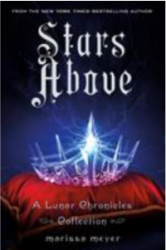
Something I feel is underappreciated in book series is when authors don't try to cram in as much material and side stories as possible to pad each of the books to be longer than they should be. Keeping the core books of a series concise helps drive the main plot forward without requiring larger and larger volumes to tie up all the loose ends introduced along the way. The Lunar Chronicles excels in this. Look no further than the "prequel," Fairest, and the collection of short stories and epilogue that is Stars Above for proof of this restraint.
I can appreciate that worldbuilding will often create so much content that it doesn't always make sense to include it in the actual storytelling. Still, some origin stories might seem interesting, only to find out that most of these moments of exposition happened along the way as the character's motives are revealed to the reader. Ergo, some stories don't need to be told. Stars Above has some stories like this, but it also contains a few worth reading, the best of which is the pseudo-epilogue to the Lunar Chronicles.
With so many different fairy tales to pull from into the Lunar Chronicles, I'm glad that Marissa Meyer had some restraint in recognizing when some of them wouldn't work with the main narrative of Cinder's rise to claim her rightful throne. The "Little Mermaid" story in this collection works on its own, but I would find myself hard-pressed to see how it would add anything to the overarching plot of the Lunar Chronicles without reworking the whole thing. Even so, it's a good story that any fan of this series will likely enjoy.
Some necessary (and not so necessary) short stories that round out the Lunar Chronicles, I give Stars Above 3.5 stars out of 5.
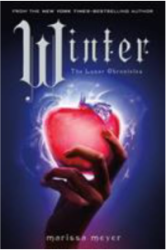
If there's one thing I appreciate with a series, it's when all the loose ends are tied up by the end. In the fourth and final installment in the Lunar Chronicles series, Marissa Meyer manages to wrap up all the disparate parts of the story that had been running in parallel for three books. Not only does this series have a satisfying ending, but there's even enough time to flesh out the titular character, Winter, so that her presence makes sense in the context of the whole series. Still, even if the backstory for Levanna in Fairest isn't directly needed to understand more of Winter's character in this book, it certainly helped that I had already read it going into this final chapter of the series.
While my standard qualms with the "teenage girl" style of characterizations remain for this book (as it has for the entire series), the dialogue feels very natural (as it has for the entire series). Ultimately, though, it feels like the ending takes forever to arrive, especially since the audience has already known for some time that Cinder is the true heir—a fact that only became apparent to her in the last few books. Plus, there's the almost constant sexual tension that runs through these books as well. I've never wanted to scream at fictional characters, "Kiss already!" so much in my life.
I will say that the sci-fi fairy tale reimagining Meyer does in the Lunar Chronicles is unique in its interpretation while also remaining relatively close to the source material's references. And while there were moments where the characters might have been annoying, all of their motivations were clear and drove them to make decisions that felt logical based on their background. Overall, I think this has become one of my favorite series lately, and I'm now looking forward to reading more of what Marissa Meyer has to offer.
A satisfying ending to the best series of sci-fi fairy tale reimaginings, I give Winter 4.0 stars out of 5.
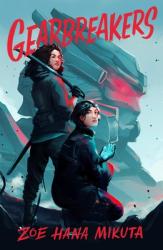
Gearbreakers is a story with two subjects. First, there's Eris, a revolutionary with a burning hatred for Godolia, the all powerful government that killed her parents and regulates her home with the giant mechas known as Windups. She has dedicated her life to destroying these Windups, and any who dare pilot them. Second, there's Sona, a Windup pilot that is scheming to destroy Godolia from the inside. When the two of them meet after one of Eris' destructive escapades goes sideways, their clashing backgrounds and mirrored desires forges an unlikely friendship, one that will change both of their lives as they know it.
This book is unusual for its genre from the get go. It's clearly a YA dystopia, with its young, child soldier protagonists with appropriately angsty personalities set against a terrifying yet monolithic totalitarian government. I've read plenty of these in my time, like most of my generation, and I'm very familiar with the elements. In this book, the usual elements are subverted immediately. Instead of starting out with a bland everyman that, despite having a hard life, isn't usually directly opposed to the system they're in, this book cuts to the chase. The first voice of the story, Sona, is introduced already chock-full of rage. The entire first chapter begins in medias res, completely skipping the usual revelations and training montages and directing us straight to a character who has just been transformed and is very ticked about this. This is something the book does very well: it trusts its audience to grasp the situation at hand, without needing the exposition many books like this are heavy in, often using heavy and lyrical prose to do so. This is another thing: the prose. The book is unexpectedly poetic in many places, which is also generally strange for the genre. I'm not talking about clunky metaphors about birds and technology, although there is a lot of stuff about technology. Just the writing itself is beautiful, interweaving metaphors and similes and personification and all that fun stuff seamlessly with the literal. This also makes the novel seem older than its setting and genre, more like an old folk tale about ancient gods and classic heroes than a YA dystopia about robots and lasers. Another bright spot in the novel is its vibrant tone, especially with the characters. Every character is brimming with emotion and character and motivations. And they're all unspeakably angry. This author is younger than most, and this definitely shows in the portrayal of the younger characters in the novel. In many books written by older authors, the teenage characters often exhibit the cynicism and stoicism of that older generation in the face of social injustice. While this leads to cool-headed, logical heroes to aspire to, none of them have the same instant relatability with the younger generation as these angry characters do. Most teenagers, in the face of unfairness, get unreasonably angry. Its a fact of life, and having unabashedly angry female teen characters who scream and yell and blow stuff up in the face of their terrible circumstances instead of passing out or something is surprisingly refreshing. The two main characters, and their deep seated anger in the face of trauma and injustice, as well as their different ways of reacting to their similar demons, makes for some great chemistry and explorations of their characters. I will admit, most other characters didn't get similar levels of development, but they were each memorable and likable in unique and fun ways.
All in all, I would simply describe this book as fun and refreshing. The action and characters and writing is all fun, and the way the author subverts typical expectations in unique and interesting ways is refreshing! I would recommend this to anyone in the mood for lots of robots, good emotional conflicts, lots of sadness, lots of laughs, and some cathartically angry female characters.
Reviewer Grade: 11
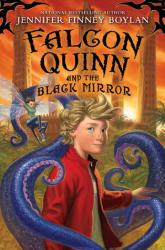
Falcon Quinn and his friends Megan Crofton and Max Parsons get on a bus that they think is taking them to their normal mundane school...
Well are they in for a surprise... They do go to a school, but not just any school. They go to The Academy for Monsters, where they are supposed to learn how to suppress their monster sides. Falcon however doesn't even know what his monster nature is.. and he certainly doesn't want to suppress it. Then on the day when they have to find out their monster natures... Falcon discovers that although he is half monster, he is also half Guardian or Monster killer. While Falcons old and new friends discover their roles; Max is a Sasquatch, Megan is a wind elemental, and his new friends Pearl, Destynee, Lincoln, Sparkbolt, and Weems are a Chuprakabra, a Giant Slug, a Werebear, a Frankenstein, and a Ghoul respectively, Falcon has to worry about getting killed for what he is. Read the book to discover which side Falcon will take, whether he will ever truly find himself, and whether his friends will still stick with him once they find out the truth...... A Review by Valkyrie a 9th grader.

Two fraternal twins named Megumu and Mitsuru Kobayashi decide to swap places for a week (Mitsuru is bad at studies and Megumu is good at them). Megumu otherwise known as Mego is a shy sweet girl who loves the feudal ages. Mitsuru meanwhile is a tough boy who goes to an all boy school full of delinquents. Mego gets saved by and accidentally kisses the top delinquent of Mitsuru's school; Aoi Sanada. When she next meets him in the guise of her brother, he luckily does not recognize her, and she finds out that he has a severe phobia of girls... which does not currently apply to her as she is dressed like a boy and he does not know she is female. Mego is somewhat saddened by this because she has a crush on him, but decides she is happy with just being around him. Aoi meanwhile starts to develop feelings for Mego, and is very confused by this, because Mego is currently his best friend... so he thinks he has homosexual feelings for his best friend. Mitsuru meanwhile has encountered Aoi's half sister Shino Takenaka and has fallen in love with her but she doesnt know he is male or that he has any feelings for her beyond best friends. The School bully Azusa Tokugawa meanwhile has found out that he is a boy and is in love with him, but he thinks she hates him. Aoi also finds out that Mego is a girl and she switches back with her brother thinking that he hates her. Aoi however really does love her and goes looking for her. Altogether a very good if confusing read.
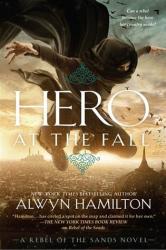
In this final book to the Rebel of the Sands trilogy, seventeen-year-old Amani is the leader of a rebellion to overthrow the Sultan. With all her friends captured and imprisoned, she's forced to step into the role of the temporary leader of the Rebellion and find a way to rescue her friends and put an end to the Sultan's tyranny. Tired, scared, and doubtful, Amani tries to keep together what's left of the rebellion without dying, when it seems like death is all that is around her.
This book was amazing! It kept me on the edge of my seat with every chapter. Reading it was a turbulent rollercoaster of laughter, crying, hope, dread, and everything emotion in between. The writing of the book itself was beautiful, and I loved that it was a combination of magic, action, romance, and was full of diverse characters. I wish there was more to the series to read!
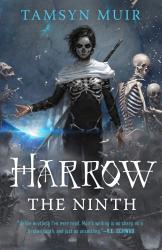
Harrow the Ninth is the second book in the Locked Tomb series, and it follows a necromancer, Harrow, as she learns to become a Lyctor to God himself, the emperor of the First House. But as the teaching progresses, the century-old secrets of God and his immortal Lyctors, the intangible death monsters hell-bent on destroying them, and Harrow's own crippled psyche threaten to crush her under their weight.
The first book in this series, Gideon the Ninth, is undoubtedly both bizarre and amazing from the very first page, all the way until the last. I read this book because I adored the first one, and I have to say it is even more bizarre and amazing, but there's an emphasis on the 'bizarre' part in the beginning and an abundance of 'amazing' in the end.
For the first thing, a good chunk of this book is told in second person. For another, the beginning is very confusing, mimicking the main characters confused state. For a third, much of the book seems to contradict the first book, or itself, giving a whole new meaning to the 'unreliable narrator'. Now, at the end, this all comes together and makes perfect sense and blows your head off in a fit of epiphany. And, having read the entire book cover to cover, I applaud the author for the bold choices and tantalizing ending. But for the beginning, it may be a bit more a struggle to push through, and the brilliance of the first book is really needed to help accomplish this.
So, the book is pretty confusing, but for the most part its understandable, and it maintains the first books commitment to levity. This book is pretty funny, even though it can be heart wrenching or gory in some bits. The main character, Harrow, is both very sad and very cool, like a skinny Batman, which I really like! She's also well developed, with understandable actions and motives. The supporting cast is fleshed out well, and highly entertaining, and very sad. All of this is very good. The plot, while confusing at first, is concluded nicely, and is well paced. The worldbuilding of this book does this thing I really like, where it never really sits down and fully explains anything, but still leaves you getting the gist of everything by passing remarks and impressions and vague implications. It did this better in the first book, but since the second book had a lot more complicated necromancy stuff to explain, I'll let it slide.
All in all, this was an extremely good book, which took risks with its material and just expected all of us to push through the bizarre for the amusing and sad characters and an unknown payoff, which we all did, and which was totally worth it! Highly recommend, but read the first book first, and if you've read the first book and you're looking for a reason to keep reading, definitely do so!
Reviewer Grade: 11
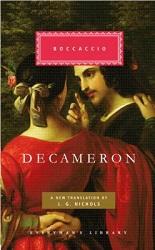
In plague struck Italy around the 1350s, 3 young adult boys and 7 teenage girls as well as their servants hide out in various castles while telling each other stories to pass the time. Each of them has to tell one story per day. For each day there is a new theme decided by the"ruler" of that day. These themes include; Misadventures with happy endings,Tragic loves, Bawdy loves, Munificence, and Avoiding Misfortune with witty remarks.
Though this is a good and classic book it is not for everyone due to it having mature sexual themes, so if you do not like such things either dont read this book or stick to the days that arent about things like those... also watch out for Dioneo's stories because he can say a story on whatever he likes. Alltogether a good book if not for everyone.
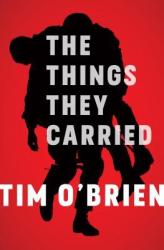
The Things They Carried by Tim O’Brien horrifically recalls Tim’s time during war, in what he calls “A true war story that isn't real”. This book recreates the experiences O’Brien went through during wartime, and is written in a very grotesque manner. The story jumps around from timeline to timeline, in a way that a lot of the time you aren't sure what perspective you’re reading from. While written very well, O’Brien has a habit of making every character seem like a horrific person and puts himself on kind of a metaphorical pedestal, in what seems to be an attempt to reconcile with the guilt he faced from the atrocities committed by him and his platoon. I would definitely recommend this book to others, despite its faults, but I believe the most important thing to know going into this book is that the events described are so grotesque they seem like made up fantasies or true stories that have been modified to seem worse than they actually are, which is part of O’Briens intention of telling the story the way he remembers it happening, not the way that it actually happened.
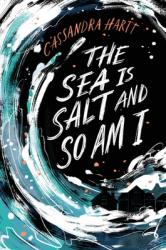
The Sea Is Salt and So Am I is a story about a girl, two brothers, and their Maine town that is collapsing around them. The powerful storms of the climate change era are destroying everything in the town they love, and while trying to save it, stories and secrets and tragedies tear them apart all while forcing them closer together. In a stunning novel about grief and loss and trust and home, Cassandra Hartt weaves a tale through the eyes of the three main characters, masterfully crafting a story that will break your heart and put it together at the same time.
I almost didn't pick up this book the first time I saw it at the library. When I saw the synopsis contained two brothers and one of the brothers best female friend, I immediately flashed back to the Kissing Booth, and all the other contrived dramas this storyline had spawned. But, I took a chance. While this book is full of drama, much of it resulting from the two brothers and the female best friend usual conflict, the story makes the characters so realistic and grounded and understandable that it's utterly incomparable to the Kissing Booth. Every main character is fully fleshed out and sympathetic, even though you'll hate almost all of them (minus Tommy) all of the time. I heard once that the hallmark of a great author is one who, when writing a character to make a horrible decision, doesn't make you despise them, but makes you fully despise the character. In other words, good writing comes from making the characters' motivations and traits so clear cut that any decision they make, no matter how horrible, makes sense for them. And the characters in this book make some horrible decisions. They're mostly terrible towards each other for the whole book, but since the author does a fantastic job of making you understand each character, you're just ticked at the characters for being terrible, which isn't fun, but it sure is captivating.
The book also has great prose, with lots of beautiful and striking imagery. Each character has a distinct voice, and you can almost see the half-drowned Maine town the story is centered on. The emotions of the characters in general are painted vividly by the prose, which is most evident with the way the author describes depression. There's a suicide attempt in this book, and the aftermath, as well as the attempts of the depressed character to recover, is well executed and genuine, and does a great job of showing the impact of the attempt on all characters involved.
All in all, this book kept me turning pages, and while it definitely wasn't a fun-hearted, it did tug at heart strings and fill my heart and break it and came from the heart and all that good stuff that can make you cry but still love it with all your heart. I'd wholeheartedly recommend this to anyone who can read about depression and suicide safely and wants to feel something you can't fully explain!
Reviewer Grade: 11
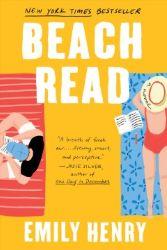
Beach Read by Emily Henry is a feel good book that will leave you rooting for January and Augustus. These two famous authors have nothing in common except that they are neighbors. One night, they make deal. Augustus will write something happy with the help of January’s expertise in romance and January will interview surviving members of a cult to write the next Great American novel. Whoever writes the bestselling book wins. Nothing else will happen, right? Beach Read reveals how being opposite in every way could quite possibly be the best thing. I highly recommend this book to anybody who needs a feel good book.
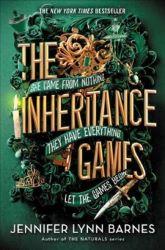
The Inheritance Games by Jennifer Lynn Barnes is a puzzling thriller of the Hawthorne family. Avery Grambs has a simple plan. Win a scholarship and go to college. Her plan is flipped upside down when she is summoned to the will reading of Tobias Hawthorne, a man she had never met, and receives all of his inheritance, $46 billion. Now faced with lethal dangers of the Hawthorne family wanting their money back and the world stunned how she got it, Avery searches for the one question everybody is asking. Why her? The Inheritance Games reveals the devastating secrets of the Hawthorne family and the risks people take to keep those secrets. I highly recommend this book for anybody who loves a unpredictable mystery.
Reviewer Grade: 11
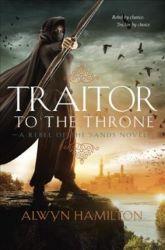
A sequel to Rebel of the Sands, Amani continues her fight for the Rebellion after being captured and sent to the palace. Thrust into the center of the regime, she's determined to bring the tyrant down. Acting as a spy, she tries to uncover the Sultan's secrets, but the longer she stays, the harder it becomes to forget that Jin's disappeared, and the more she questions whether the Sultan is really the villain she'd been told he is and who the real traitor is to her beloved homeland.
I like this series because it's action-packed, has elements of fantasy, and romance. Each chapter never disappoints, and I felt like I was being sucked into the heart of the Rebellion just from reading about it. Amani quick-witted passionate personality makes her an admirable character, and her closest friends have stories that make it really hard not to love them too. I can't wait to read the last book!
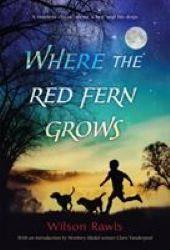
Where the Red Fern Grows by Wilson Rawls is an emotional masterpiece, and it is the first book that ever made me truly cry. Watch as Billy Colman scrapes together the money he needs to fulfill his dream, buying two hounds to hunt racoons. Thrill as Billy quickly becomes famous for his exploits, and fall in love with his trusty furry companions Little Ann and Old Dan. This book will emotionally connect with anyone who has ever has a furry friend and it will take your heartstrings along for the ride as Billy and his dogs go through thick and thin. I would recommend this exceptional book to anyone who is looking for a heavier and more emotional read.
Grade 12
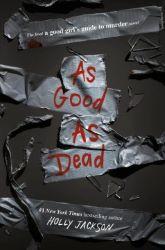
This is the final book in a truly unearthing trilogy. Pip is a girl who started out with a murder case that happened six years ago, but she thought there was something up with it, that turned into a kidnapping case that lead her to her last hurrah, a twisted, all-encompassing, serial killer tale. Throughout this book, Pip finds a new side to the story every day. And each day the threat gets more and more aggressive and violent than before. She and Ravi are solving a case together until it all falls apart and now they have a new mission. This book ties the series together perfectly. What happens to Nat, and Conner, Naomi, Cara, Ravi, and Pip, The Bell family, and last but certainly not least Max. Will Ravi and Pip be able to solve the crime of the century or do they have to do something even harder? This book is full of the best (and scariest) twists we have seen yet, it dives deep into how abuse and obsession can trigger somebody to do things we all thought weren't even possible.
Grade: 8
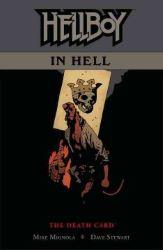
The Death Card concludes the solo storyline of Mike Mignola's Hellboy. In The Death Card, Hellboy begins to discover the consequences of his actions in The Descent, and sees hope for a new, restored world. He also seems to fully grasp the power of his Right Hand of Doom and... well, I shouldn't tell you too much. But you can know that this is the end, the great conclusion, written and drawn by Mignola. And on that note: Mignola's art here is as good as ever. The scene with... well, I still can't tell you too much, but there's a part that's actually painted. The art is is great. And the writing is good as well. Hellboy in Hell: The Death Card delivers a satisfying end to the tale of Hellboy.
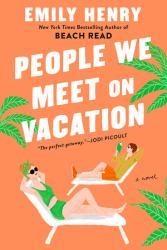
People We Meet on Vacation by Emily Henry tells a story everybody can relate to: what to do when a friendship becomes something more. Alex and Poppy have been best friends since college and as a tradition, go on a spectacular one week vacation every summer. Until two years ago, when everything collapsed and neither have spoken to each other since. Now, Poppy hopes to rekindle this friendship by convincing Alex to go on a final vacation. Will this week long vacation be enough to fix the past or was this “friendship” never meant to be? People We Meet on Vacation will have you rooting for Poppy and Alex as they maneuver through love, life, and lies. I highly recommend this book to anybody who craves unpredictability.
Reviewer Grade: 11





 We are experiencing recent outages to the online catalog, PPLD mobile app, and Libby/OverDrive. Click here to learn more.
We are experiencing recent outages to the online catalog, PPLD mobile app, and Libby/OverDrive. Click here to learn more.